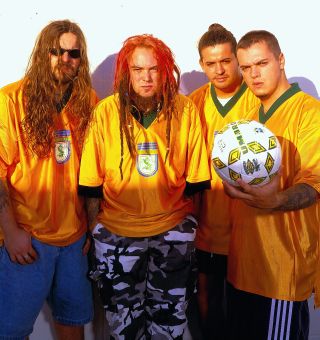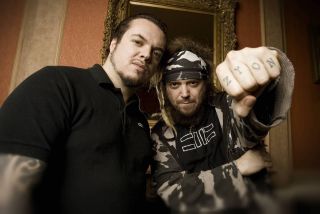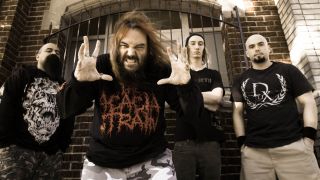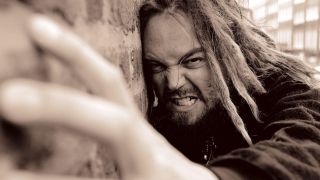Max Cavalera is a Brazilian singer, guitarist and songwriter. His music career began in 1984, when he co-founded Sepultura with his brother Igor Cavalera. After quitting that band in 1996, Max formed Soulfly in 1997. A decade later, he teamed up with his brother once more to start the Cavalera Conspiracy.
As if that wasn’t enough, he was also in the short-lived side project Nailbomb (94-95) with Alex Newport of Fudge Tunnel, and in 2011 he formed heavy metal supergroup Killer Be Killed with The Dillinger Escape Plan’s Greg Puciato. The line-up was completed by the addition of Troy Sanders (Mastodon) and Ben Koller (Converge) in 2013, and the group released their self-titled debut album in 2014.
To top it all off, the celebrated frontman has also collaborated with Dave Grohl, Mike Patton, Fred Durst, Jonathan Davis, Chino Moreno, Corey Taylor, Sean Lennon, and many, many more.
We met up with Max before a recent Soulfly show in London to discuss his various projects, sobriety, spirituality, family, and heavy fucking metal…
“My childhood in São Paulo was really cool. My dad had a really good job. He worked at the Embassy as a diplomat – and we had a house on the beach that we’d go to at the weekends. It was called Praia Grande, which means big beach, and it was only an hour and a half drive from São Paulo so we’d go there all the time. We’d also go to a lot of football games. Our team was Palmeiras, and we went to the stadium a lot. So my childhood in São Paulo was really cool. But we had to move to Belo [Horizonte] after my father died.”
“We started Sepultura in Belo, but once the band started doing good after we released Schizophrenia we moved back to São Paulo. By that point we were really into partying and drinking, and we had lots of friends in metal. We lived right downtown, in a crazy location right by a place called Boca do Lixo, which means ‘mouth of the trash’. It was wild, man. There was this bar called Retro, and I’d go there and hang out a lot. It was for the people who were called ‘darks’ at the time, so it was more of a gothic vibe, but we were very welcome and we’d go hang out there all the time. There wasn’t really a metal bar in São Paulo at that time, so we had to go to this gothic bar, but it was cool because they’d play a lot of Ministry and Killing Joke and stuff like that, and that side of music definitely influenced us as well. São Paulo is a cool city, man. It’s a big city too – very, very big. It was a big part of Sepultura history as well. Beneath the Remains and Arise were both written there, and it was a big part of our life for a long time.”

“Having a family stops you from turning into a rock star asshole. They keep you very grounded, and remind you that you’re not the rock god that some people say you are. That’s good for you. Maybe other rock star assholes don’t have families, I don’t know. It might not work for them. But it works for me: I never get a big head and I never think that I’m better than anybody else. And I love the fact that we don’t hide our family from the fans. That’s always been exposed, and we’re one of the most metal families out there. The Cavaleras are notorious for being a metal family, and I’m proud of that fact. I think it’s great!”
“I’ve been straight edge for eight years now, so my days of puking on Eddie Vedder are done. The wild days are in the past. Nowadays, it’s more about the music and we all work towards one goal, which is Soulfly, Cavalera Conspiracy, Killed Be Killed, and then the kids’ bands; so Lody Kong and Incite. I’m excited for their future too, man. It’s killer to see the family branching out in all different directions.”

“If my wife and kids stayed at home and I didn’t see them for ten months out of the year, I would never survive. I got lucky in that area because I get to bring them with me and work with them. My wife is my manager so she’s out with us all the time, and that’s kind of rare because a lot of bands don’t bring their manager on tour with them, but it’s nice for us to have her out with us making sure everything works good. So it’s a major plus to have her out with us, and we have all of our kids out with us too, so the tour bus is a real family vibe right now. Even the crew is like our family, because the same guys have been with me since I started touring with Soulfly in ’98. We all do shit together, and watch out for each other, and get in fights for each other, and fight within each other – just like any family.”
- Igor Cavalera admits Korn influence on Sepultura's Roots
- Celebrating 30 years of Sepultura
- Sepultura: "I Cut Off My Hair To Get A Copy Of Ride The Lightning"
- The 10 most underrated Soulfly songs
“If you want to get an idea of what those crazy old school shows were like though, watch the Under Siege [Live in Barcelona 1991] video. I’m really glad we captured that on film. It’s killer, man. There were some other even crazier shows that didn’t make it on video, too. They were madness. That’s how I broke my teeth, from a microphone hitting them. I got hit in the head with a flashlight in Australia as well, all kinds of crazy shit like that. But I’m attracted to chaos, you know. When it gets chaotic, I just laugh, I don’t even care. Even today, when people get up on stage during our shows I always tell the roadies, ‘Don’t get rough with them. Just throw them back out, it’s all good. They’re just trying to have a good time.’”
“It feels like just yesterday that we recorded the Roots album with Sepultura – not 20 years ago! Time really does fly, man. The idea for the album wasn’t that well accepted at first. I remember Roadrunner Records did not understand it, and they hated the name: they thought it sounded like a reggae compilation. But I explained to them that we were taking the name out of the reggae world and bringing it into the metal world. I wanted to make that word metal. Later on they got it, and I’ve seen all kinds of things with ‘Roots’ in the title now. As far as the jungle trip goes, that was one of the best things I’ve ever done. I’ve always been into different cultures, and I loved history and geography as a kid, so when we had the chance to go and spend time with Xavante tribe that was huge for me. Nothing like that had ever been done in metal before, and when you do those first things they’re scary and cool at the same time because you have no idea what’s going to happen. It was more like a National Geographic trip than a metal thing because we were doing something totally outside the realm. The whole experience was wild, and I’d love to do more of that stuff in the future.”
“Killer Be Killed is a wild mix of bands that shouldn’t work at all but it does. Mastodon, Soulfly and The Dillinger Escape Plan are from three different planets. But we pulled it all together and created one big planet. It was nice to hear people saying that they normally put supergroups down, but they couldn’t put this one down because the record was so cool. We worked really hard on it, man. I ended up tracking all the guitars for the record, and it was a little bit overwhelming to do so much work, but for me that was an awesome experience and I think the songs came out great with all three vocals: I think they sound really magic together, and they blend so well. The question now is, ‘Can we top the first record?’ We’re going to have to make an even cooler record the second time around. Greg is doing the riffs right now, and Troy and I are putting riffs aside, so that’s the first phase, and then we’re going to get together and do some jamming hopefully some time in the middle of the year. I’d love to come to the UK and do some Killer Be Killed shows, but I don’t know how that will work. But now that we know each other better, I think we can explore that and make an even better record. As much as I like that first one, I think we can do a second one that tops it.”
“After I left Sepultura I went to Ozzy’s house and he sat me down and encouraged me to carry on making music. He told me I could do it, and coming from him that was huge; it was the man himself telling me I could do it, so I made sure that I did it. Right after that was when I wrote Eye for an Eye, which was the first song I wrote for Soufly, and it was really important to me that Soulfly was firstly accepted, and secondly that it gave me the creative freedom to take this thing even further than I’d done with Sepultura. I’m really proud of that first record too, and I think it was really unique. We’re on to ten albums now and there’s a lot of cool stuff in there, from the crazy instrumentals that would have never happened with Sepultura, to all the guests, from Tom Araya and Corey Taylor to Sean Lennon and Chino Moreno. It gave birth to a lot of cool stuff, and I’m very thankful to Soulfly. It’s been a wild ride, and I think what’s cool about Soulfly is that over the years we’ve gotten heavier and heavier. A lot of bands get mellower and more commercial, but we went the other way and I think that’s great. The original concept was to mix metal and world music, and I don’t think we’re quite there yet, so you can expect more of that experimental crazy shit.”

“The benefit to being spiritual is you have something to believe in; I think that’s very positive, because otherwise there’s a void there. But I think being spiritual is different to being religious. I was brought up Catholic, but I don’t really follow and I don’t really agree with a lot of Catholic rules. I believe in the spiritual world, and my God doesn’t ask for money – he’s not a broke God. I’ve always had a very interesting mix though. My mother believed in a Brazilian religion called Candomblé, which is from Africa and is a kind of variation of Voodoo possession and transformations and shit like that. Then my wife’s side of the family is all hardcore Russian Orthodox, and I like all the symbolisms and the icons from Orthodox churches. We have a lot of priests that are fans of Soulfly actually, and when we play Moscow there’ll be like four priests in the dressing room with the big beards, just hanging out. No other bands have that, you know. It’s pretty wild. But I think it’s important to have faith. The negative side is that we sometimes get branded as a Christian band, and that’s not the case at all. We’re not preaching that shit. I believe in God, but what you believe is up to you and I’m not going to argue with you. I’m not here to transform anyone. That’s not my job. I’m here to make metal, and in a way metal is my religion: the stage is my altar and the congregation is the crowd.”


